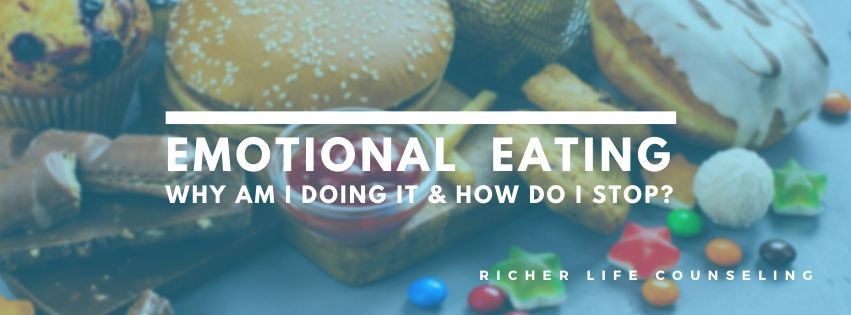Why Am I Doing It & How Do I Stop?
This is my true, personal experience with emotional eating:
There I stood, staring into my pantry, searching for anything that would taste yummy and make me feel good–not physically good but rather, mentally and emotionally good. It would take away my stress and sadness. I had just hung up from a distressing phone call. Per standard protocol after every moment I felt stressed out, I walked to the pantry and looked for food. It worked wonderfully, every single time I felt stressed, and if it wasn’t food it was high sugar drinks. The truth was, it hadn’t worked wonderfully. I had packed on pounds, felt depressed, ashamed, and my self-esteem was at an all-time low. I had been emotionally eating and it had taken a toll on me.
Emotional Eating Is About Emotions

I came to learn that it was important to recognize my emotional distress and recognize the thoughts I was having about my stress. I needed to learn what situations and people were triggers. More importantly, I needed to learn how to cope in healthy ways and not react to the distress I was feeling.
First, what is emotional eating? We define emotional eating as eating in a way in which one soothes or suppresses negative emotions. Some negative emotions are anger, boredom, sadness, stress, and loneliness. When we engage in emotional eating, it perpetuates those negative emotions and increases feelings of guilt and shame.
How To Stop Emotional Eating
If you’re relating to this and recognize you’re eating emotionally, you may be asking, “why am I doing it and how do I stop?” Here are some TIPS for overcoming emotional eating:
Seek the support of a therapist. A therapist can help you identify patterns of behavior, offer psychoeducation to help you better understand your response to stress, increase coping skills and help you remove unhealthy behaviors. Sometimes a person is your trigger; understanding and implementing boundaries with that person is essential to you achieving your goals and let’s be real, setting and maintaining boundaries isn’t always easy to do.
Learn your triggers. What triggers your negative emotions? If you’re not sure, start a journal specifically about your emotions, life events, and food. There’s a difference between true hunger and emotional hunger.
Before you eat, stop and ask yourself, “Why am I eating? “What am I feeling?” The HALT acronym is helpful. Ask yourself, “Am I hungry, angry, lonely or tired?”

- Hunger: Increase your nutrition knowledge; meal prep and avoid buying junk food. If it’s not accessible, you can’t eat it.
- Anger: If you stop, breathe and reduce feelings of anger, you are more likely to talk versus act on the desire to eat.
- Lonely: When we’re stressed, depressed, and feel completely overwhelmed, we tend to isolate and yet, we’re human! We desire socializing and connection. Seek the support of others, volunteer, find a support group or start a group of your own. Be vulnerable and share your emotional and social needs with others.
- Tired: We need an appropriate amount of sleep. Did you know that adults 60 years old need at least 7 hours of sleep? Giving your mind and body the chance to rest is important in improving and overcoming emotional eating.

Exercise. Releasing the feel-good endorphins improves mood and the exercise is an excellent distraction from the pantry and fridge. Studies suggest that lifting weights has been shown to help with depression.
Develop A Self Care Tool Kit – My Colleague. Tyler Rich, a Marriage and Family Therapist, also loves helping people stop destructive behaviors. He encourages clients to build a self -care kit so when you experience uncomfortable emotions you can learn what to do with them. Check out his article on this topic here.
Eat Mindfully
You may be asking what I mean by mindful eating. Eating mindfully means taking the time to notice the smell, texture, color, shape–anything about the food. In doing so, you’ll eat slower and your body will recognize when the hunger has been fulfilled. It helps in avoiding overeating. Here’s an example of mindful eating. Imagine you are eating a strawberry. Pick up the strawberry and examine it before eating it–take note of the color. Notice that there are different shades of red and green. Feel the texture. Smell the strawberry. Take one small bite, but before swallowing, notice how it feels in your mouth–was it juicy? Was it more sour than expected? What’s the texture? How does it taste? Is it sweet? This technique can be used with everything you eat.
Dr. Susan Albers, Psy.D., is a clinical psychologist at the Cleveland Clinic. She specializes in eating issues, weight loss, concerns about body image, and mindfulness. She suggests using a 5-5-5-5-5 Exercise. In this exercise, you write down 5 people you can reach out to when you’re upset and need to vent, 5 ways in which you can relax (listen to music, take a bath), 5 places you can go to in order to calm down (bedroom, outdoors), 5 positive things you can say to yourself (like “I’ve got this!” “I can overcome this!”), and 5 distraction activities (e.g., puzzle, meditate, go for a walk). When you’re struggling with emotional eating, try one of these activities for 5 minutes. (Learn More)

We love our electronics. I get that. I like mine, too, but don’t multitask when you’re eating; put down the phone. If you’re multi-tasking, you’re not eating mindfully and the next thing you know, you’ve eaten that whole bag of chips when you told yourself you’d eat a portion size.
Practice self-compassion; you may have a bad day and overeat–don’t beat yourself up. Tomorrow is a new day. I would love to hear your story in the comments below. If you are ready to Stop Emotional Eating, please contact me today.
Contact us today by calling or texting 702-518-1546, email, or booking a session by hitting the appointment request button. We can normally get you into a session within 24 or 48 hours.
We offer both online therapy (learn more about online therapy here) and in-person therapy at our Las Vegas office. Our office is located in West Las Vegas right off the 95 & Rainbow. Our address is 222 S. Rainbow Boulevard | Suites 113-114 |Las Vegas NV 89145
- What Is Your Banana? - August 10, 2021
- Premarital Counseling - June 24, 2020
- Why Therapist Ask: How Does That Make You Feel? - June 2, 2020

